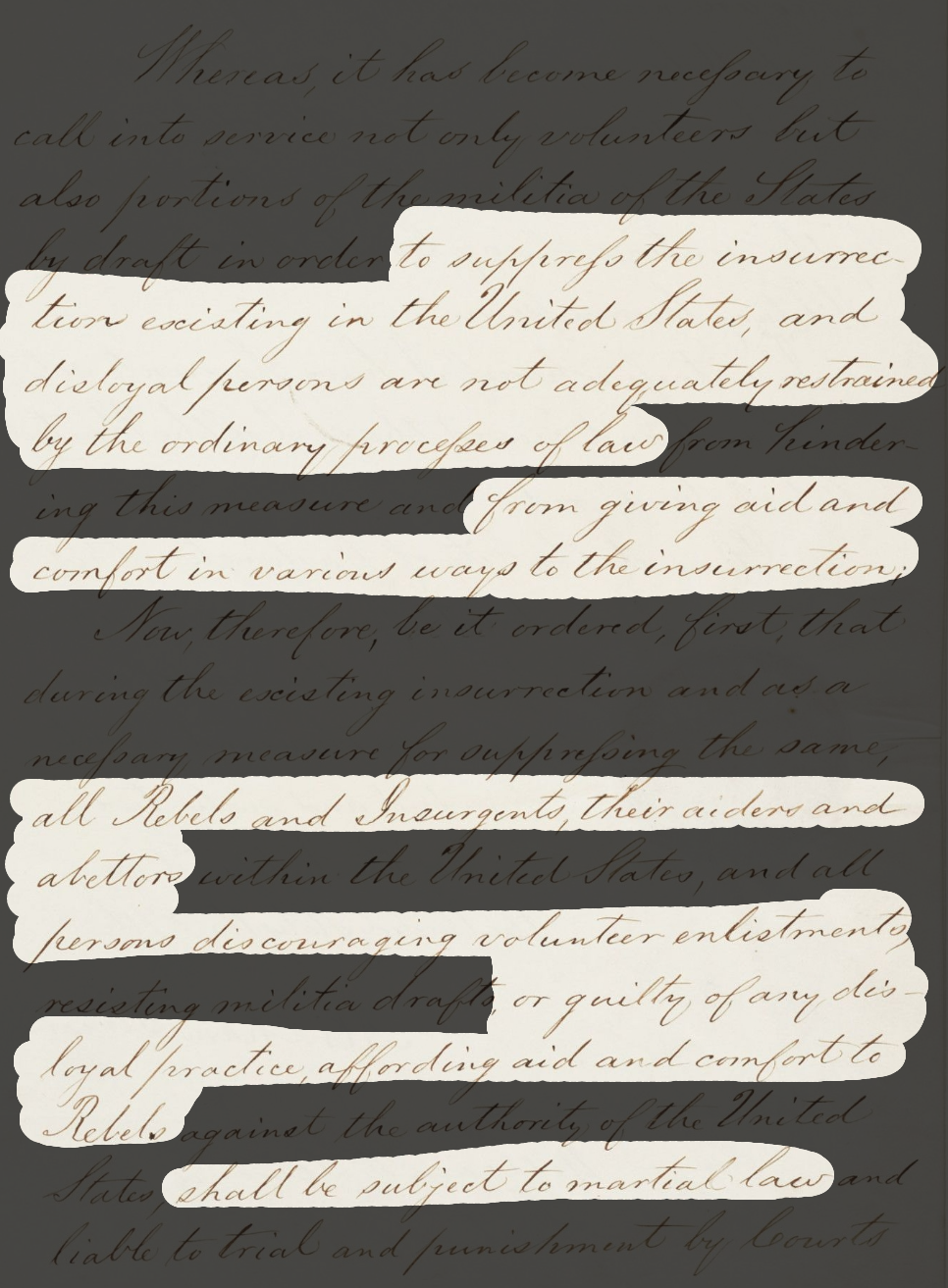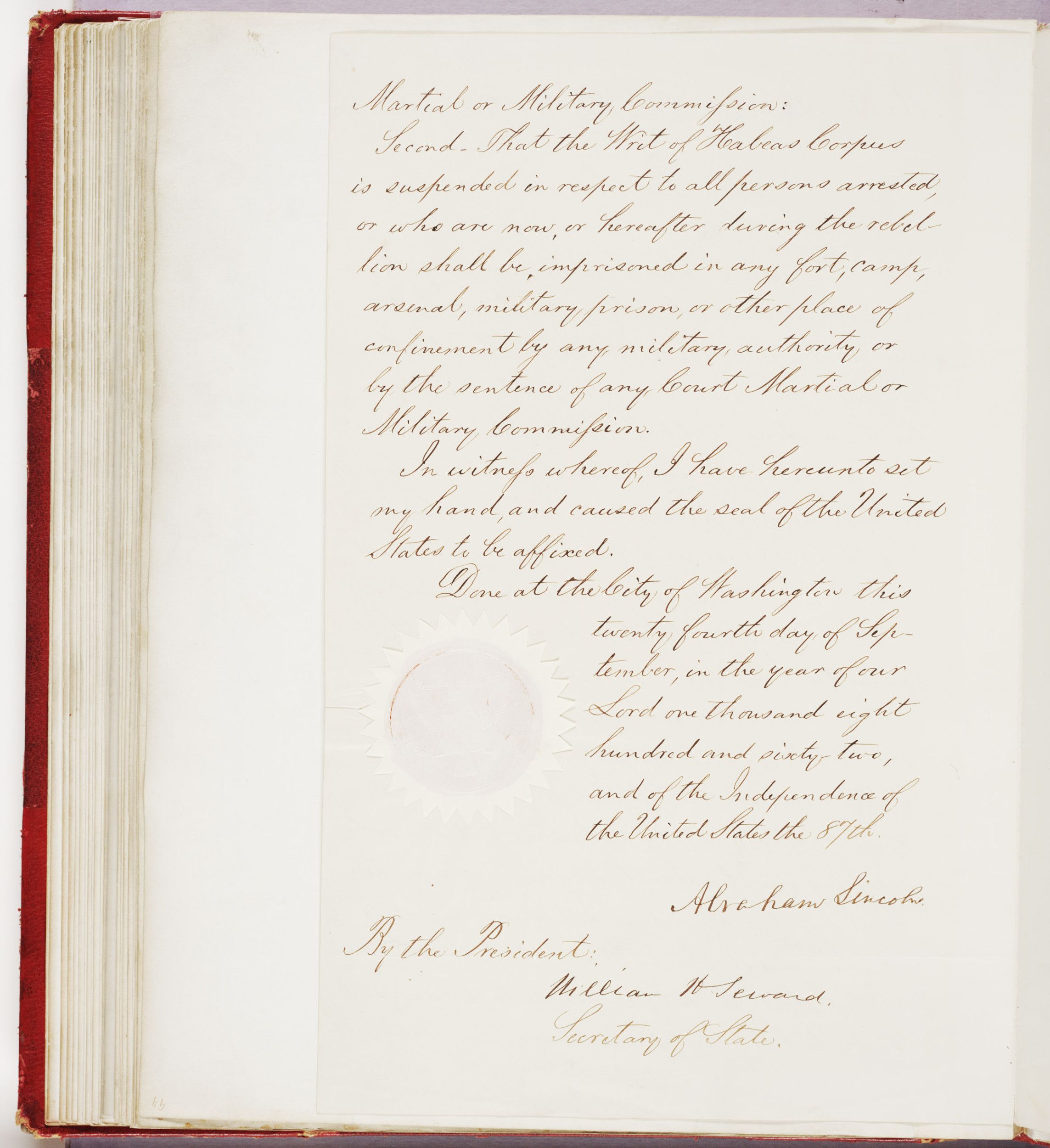Was Lincoln's Suspension of Habeas Corpus During the Civil War Justified?
Focusing on Details: Spotlight
All documents and text associated with this activity are printed below, followed by a worksheet for student responses.Introduction
In 1862, President Lincoln issued Presidential Proclamation 94 which suspended the writ of habeas corpus. (The writ of habeas corpus is a tool preventing the government from unlawfully imprisoning individuals outside of the judicial process). Article 1, Section 9 of the Constitution states that "the Privilege of the Writ of Habeas Corpus shall not be suspended, unless when in Cases of Rebellion or Invasion the public Safety may require it."Study the proclamation below, paying particular attention to the highlighted words, to determine how Lincoln justified suspending habeas corpus. Click on "View Entire Document" to read the full document as well as a transcription.
Then, using this document plus your knowledge of the Civil War and the Constitution, answer the Discussion questions.
Name:
Class:
Class:
Worksheet
Was Lincoln's Suspension of Habeas Corpus During the Civil War Justified?
Focusing on Details: Spotlight
Examine the documents included in this activity and write your response in the space provided.
- How would you describe Lincoln's language?
- How are members of the Confederacy categorized?
- How does Lincoln justify enacting martial law and suspending habeas corpus?
- Is his suspension justified by the wording in Article 1, Section 9 of the Constitution?
- If you were a Supreme Court Justice, would you rule Lincoln's suspension constitutional or unconstitutional?
Your Response
1
Activity Element
Presidential Proclamation 94 of September 24, 1862, by President Abraham Lincoln suspending the writ of Habeas Corpus.
Page 1

Conclusion
Was Lincoln's Suspension of Habeas Corpus During the Civil War Justified?
Focusing on Details: Spotlight
Respond to the following:
The Constitutional provision of separation of powers grants the Supreme Court the power to interpret laws and the President the power to enforce them. What are the constitutional implications when the President refuses to enforce Supreme Court decisions? (In 1861, in the case Ex Parte Merryman, Supreme Court Chief Justice Roger Taney had issued a ruling stating that the authority to suspend habeas corpus lay exclusively with Congress. Lincoln refused to abide by the ruling.)
Did the ends justify the means in this case – Lincolns suspension of the writ of habeas corpus during the Civil War? Do you know of other historical examples of a President's hesitation to enforce a Supreme Court ruling?
Your Response
Document
Presidential Proclamation 94 of September 24, 1862, by President Abraham Lincoln suspending the writ of Habeas Corpus.
9/24/1862
President Abraham Lincoln issued this Presidential Proclamation 94 suspending the writ of habeas corpus during the Civil War. The writ of habeas corpus is a tool preventing the government from unlawfully imprisoning individuals outside of the judicial process.
Transcript
[page 1]By the President of the United States of America,
A Proclamation.
Whereas, it has become necessary to call into service not only volunteers but also portions of
the militia of the States by draft in order to suppress the insurrection existing in the United
States, and disloyal persons are not adequately restrained by the ordinary process of law from
hindering this measure and from giving aid and comfort in various ways to the insurrection;
Now, therefore, be it ordered, first, that during the existing insurrection and as a necessary
measure for suppressing the same, all Rebels and Insurgents, their aiders and abettors within the
United States, and all persons discouraging volunteer enlistments, resisting militia drafts, or
guilty of any disloyal practice, affording aid and comfort to Rebels against the authority of the
United States, shall be subject to martial law and liable to trial and punishment by Courts
[page 2]
Martial or Military Commission:
Second. That the Writ of Habeas Corpus is suspended in respect to all persons arrested, or who
are now, or hereafter during the rebellion shall be imprisoned in any fort, camp, arsenal, military
prison, or other place of confinement by any military authority or by the sentence of any Court
Martial or Military Commission.
In witness whereof, I have hereunto set my hand, and caused the seal of the United States to be
affixed.
Done at the City of Washington this twenty fourth day of September, in the year of our Lord one
thousand eight hundred and sixty-two, and of the Independence of the United States the 87th .
[signed] Abraham Lincoln.
[signed] By the President:
William H Seward
Secretary of State.
This primary source comes from the General Records of the United States Government.
National Archives Identifier: 299959
Full Citation: Presidential Proclamation 94 of September 24, 1862, by President Abraham Lincoln suspending the writ of Habeas Corpus.; 9/24/1862; Presidential Proclamations, 1791 - 2016; General Records of the United States Government, ; National Archives Building, Washington, DC. [Online Version, https://docsteach.org/documents/document/lincoln-habeas-corpus, April 19, 2024]Presidential Proclamation 94 of September 24, 1862, by President Abraham Lincoln suspending the writ of Habeas Corpus.
Page 1

Presidential Proclamation 94 of September 24, 1862, by President Abraham Lincoln suspending the writ of Habeas Corpus.
Page 2




